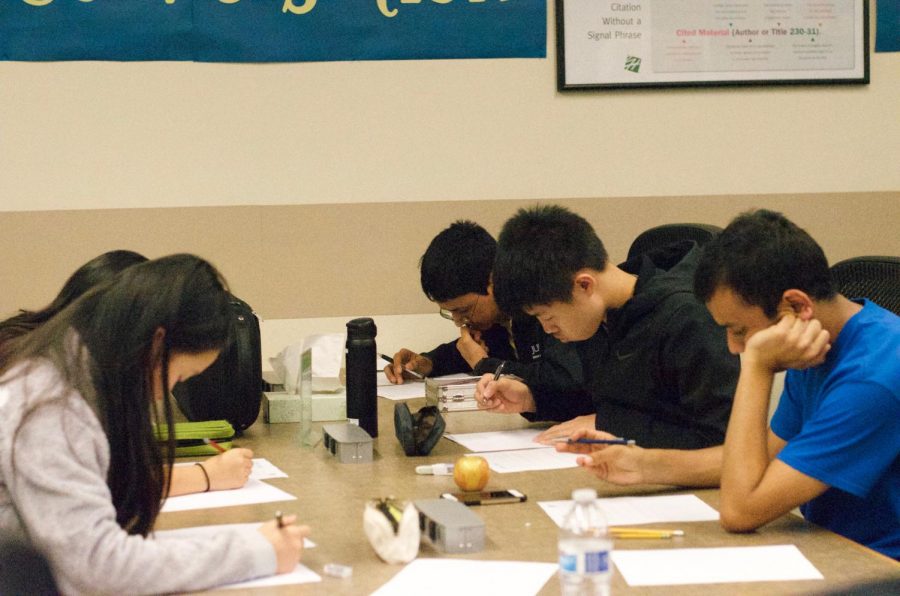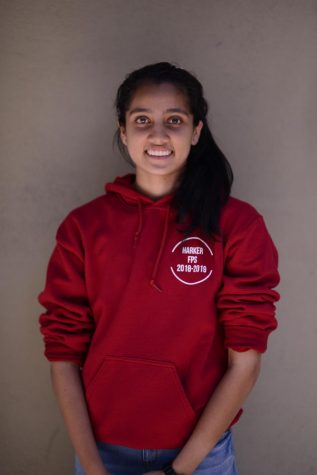Math Club prepares to compete in upcoming Princeton University Math Competition
Math Club members work on practice problems for the Princeton University Mathematics Competition. The competition will take place on Nov. 18.
November 15, 2017
The Math Club will compete in Princeton University Mathematics Competition (PUMaC) on Nov. 18. PUMaC is a student-run math competition organized since 2006 to motivate high school students to both enjoy the study of and foster a love for mathematics. About 70 teams from across the nation participate each year in the on-site PUMaC competition.
The team of eight Harker students from the Math Club participating in PUMaC is comprised of senior Swapnil Garg; juniors Katherine Tian and Michael Wang; sophomores Cynthia Chen, Rohan Cherukuri, Rishi Dange and Jeffrey Kwan and freshman Utkarsh Priyam.
PUMaC consists of four parts: Power Round, Individual Test, Team Test and Live Round.
The Power Round is an off-site introduction to proof based mathematics to the team a week before the competition. PUMaC is different from other math competitions because of the week long Power Round before the contest about problems related to specific math concepts like elliptic curves and group theory in 2015, cryptography and mathematics behind cryptographic systems in 2016.
“Other competitions have hour long power round during the actual competition so you don’t get to go in-depth, but [for PUMaC] you get to work with the team for a whole week and bond,” team captain Swapnil said.
In the Individual Test, each participant takes two tests from four subject areas: Algebra, Combinatorics, Geometry and Number Theory. Each individual test is 60 minutes long and has eight questions.
The Team Test is an on-site collaboration amongst team members on non-proof based problems for 30 minutes. The Live Round is a team round with a live scoreboard to generate competitive spirit. The top 10 finalists in each individual test are invited for the Individual Finals. There are three proof-based problems to be solved in 60 minutes.
There will also be some mini events for the participants to have fun and enjoy the event like puzzle hunt, Rubik’s cube, math bowl, and chess and board games.
“I’m really excited for the competition since I think it will be a rewarding experience,” team member Cynthia Chen said. “I’ll be able to learn more math as well as bond with my team members.”
For the past few weeks, the team has been preparing for the competition by reviewing problem solving techniques, practicing in teams for the Team Test, and working on individual tests.
“We do practice problem sets and meet once a week to work on problems or team rounds together,” Katherine said.
When upper school students last attended this competition in 2015, the team placed 19th, and the members aim to beat the prior record this year.
“We hope to possibly break top ten this year,” Swapnil said. “That’s our main goal.”
Other than the math competition, the team also has the option to compete in the Princeton University Physics Competition on Nov. 19.


















![“[Building nerf blasters] became this outlet of creativity for me that hasn't been matched by anything else. The process [of] making a build complete to your desire is such a painstakingly difficult process, but I've had to learn from [the skills needed from] soldering to proper painting. There's so many different options for everything, if you think about it, it exists. The best part is [that] if it doesn't exist, you can build it yourself," Ishaan Parate said.](https://harkeraquila.com/wp-content/uploads/2022/08/DSC_8149-900x604.jpg)




![“When I came into high school, I was ready to be a follower. But DECA was a game changer for me. It helped me overcome my fear of public speaking, and it's played such a major role in who I've become today. To be able to successfully lead a chapter of 150 students, an officer team and be one of the upperclassmen I once really admired is something I'm [really] proud of,” Anvitha Tummala ('21) said.](https://harkeraquila.com/wp-content/uploads/2021/07/Screen-Shot-2021-07-25-at-9.50.05-AM-900x594.png)







![“I think getting up in the morning and having a sense of purpose [is exciting]. I think without a certain amount of drive, life is kind of obsolete and mundane, and I think having that every single day is what makes each day unique and kind of makes life exciting,” Neymika Jain (12) said.](https://harkeraquila.com/wp-content/uploads/2017/06/Screen-Shot-2017-06-03-at-4.54.16-PM.png)








![“My slogan is ‘slow feet, don’t eat, and I’m hungry.’ You need to run fast to get where you are–you aren't going to get those championships if you aren't fast,” Angel Cervantes (12) said. “I want to do well in school on my tests and in track and win championships for my team. I live by that, [and] I can do that anywhere: in the classroom or on the field.”](https://harkeraquila.com/wp-content/uploads/2018/06/DSC5146-900x601.jpg)
![“[Volleyball has] taught me how to fall correctly, and another thing it taught is that you don’t have to be the best at something to be good at it. If you just hit the ball in a smart way, then it still scores points and you’re good at it. You could be a background player and still make a much bigger impact on the team than you would think,” Anya Gert (’20) said.](https://harkeraquila.com/wp-content/uploads/2020/06/AnnaGert_JinTuan_HoHPhotoEdited-600x900.jpeg)

![“I'm not nearly there yet, but [my confidence has] definitely been getting better since I was pretty shy and timid coming into Harker my freshman year. I know that there's a lot of people that are really confident in what they do, and I really admire them. Everyone's so driven and that has really pushed me to kind of try to find my own place in high school and be more confident,” Alyssa Huang (’20) said.](https://harkeraquila.com/wp-content/uploads/2020/06/AlyssaHuang_EmilyChen_HoHPhoto-900x749.jpeg)







